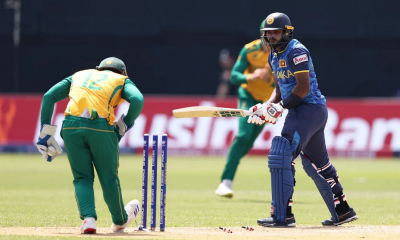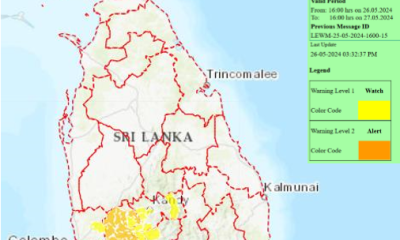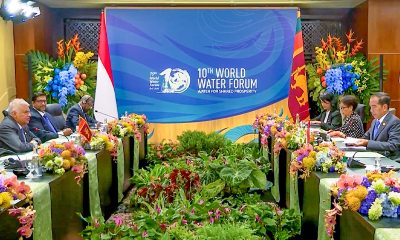Features
Will Govt decriminalize same-sex relations?

By Kaushalya Sendanayaka Arachchi
(Groundviews) In 2022 parliamentarian and lawyer Premanath C. Dolawatte presented to parliament a Private Member’s Bill to amend Sections 365 and 365A of the Penal Code of Sri Lanka with the aim of ensuring the rights of the LGBTIQ community. Reflective of its Victorian values, these penal provisions prohibit “carnal intercourse against the order of nature” and “gross indecency,” which is misinterpreted to discriminate, and harass LGBTIQ persons and criminalize same-sex sexual conduct between consenting adults. The former offense, widely understood to apply to sexual acts between same-sex individuals, carries a sentencing of ten years while the latter a two year imprisonment. The Bill proposes to amend Section 365 by limiting the offense to Bestiality and to repeal 365A in its totality. It also states that the intention of the legislature is to no longer punish a person merely because of their sexual orientation.
The Bill was subsequently handed over to President Ranil Wickremesinghe where he stated that the government will not oppose the amendment. Mr. Dolawatte, at a public forum inclusive of major political parties including the Samagi Jana Balawegaya and Ceylon Workers’ Congress, also stated that he was hopeful that a majority of MPs in the House would support his Bill and join the effort to protect the rights of the LGBTIQ community. Earlier this year, the government declared its support for decriminalization. This came as a response to several urges made by the international community during the fourth cycle of the Universal Periodic Review by the UN Working Group.
According to Standing Orders of Parliament, the Bill was referred to the Attorney General’s Department to clarify its consistency with the constitution, was later gazetted and thereafter placed in the order paper of Parliament on April 4. As per Article 121(1) of the Constitution, a Bill can be challenged for its constitutionality in the Supreme Court within 14 days of the Bill being placed on the Order Paper of the Parliament.
A petition was presented to the Supreme Court on April 17 by petitioners Brig. (Rtd) K. Athula H. De Silva, Shenali D. Waduge and Jihan Hameed challenging the constitutionality of the Bill to amend the Penal Code which would decriminalize consensual same-sex sexual conduct among adults. The petition called for a declaration that the Bill would require a two thirds majority in parliament and a public referendum. In support of the Bill, a number of intervenient petitioners filed petitions as well. This included LGBTIQ organizations and activists such as EQUAL GROUND, National Transgender Network, Equité Sri Lanka, Aritha Wickramasinghe and Dr. Visakesa Chandrasekaram. Petitions were also submitted inter alia by the Family Planning Association (FPA), Sri Lanka College of Psychiatrists, Sri Lanka Psychological Association, Centre for Policy Alternatives (CPA), Professor Savitri Goonasekere, Radhika Coomaraswamy, Natasha Balendra, and Dr. Kapila Ranasinghe.
The case against same-sex relations
Counsel for the petitioners and supporting parties firstly argued that decriminalization would affect the wellbeing of children and that the state under Article 12(4) of the constitution has a duty towards the advancement of children. In support of this argument the parliamentary debates (Hansard) that took place in 1995 was illustrated where the above penal sections were amended to encompass the offense if committed against a child below the age of 16, therefore taking into account the best interest of children. Hence, the false narrative that decriminalization would promote LGBTIQ persons who are child molesters and predators was linked here.
Secondly it was argued that legally allowing homosexuality would exacerbate the present situation of HIV/AIDS although this argument was not successfully backed by any statistics during oral submissions. Evidence indicates that criminalization of LGBTIQ persons itself deprives vulnerable victims from accessing basic medical services. This would also mean denying their sexual rights such as freedom, privacy, dignity and accessing the highest standard of health. The National STD/AIDS Control Program in its National HIV/STI Strategic Plan for 2018-2022 – which is also the state policy – very clearly admits that in order to reduce stigma and violence directed towards LGBTIQ persons penal provisions such as Section 365A need to be repealed.
The petitioners reserved their fallback argument to the last: culture of the nation and morality. Here it was argued that the proposed amendment is prejudicial towards the culture. Attention was given to the preamble of the constitution where it refers to attaining “Cultural Order” and directive principles of state policy in Article 27, specifically Article 27(2)(g) where the state should have the objective of “raising the cultural and moral standards of the People.” The religion argument was then taken up specifically focusing on Article 9 of the constitution, i.e., that the state will give prominence to Buddhism. However, the petitioners failed to take into account the restriction placed on Article 9 by the preceding article which provides for freedom of thought, conscience and religion. As held in the case of Ashik v. Bandula & Others (Noise Pollution Case) 2007, “Sri Lanka is a secular State” and as per Article 3 of the constitution sovereignty vests in the people.
The issue of “public indecency”
During the Supreme Court hearing of the intervenient petitioners’ case the judges raised an issue as to whether repealing Section 365A on “acts of gross indecency among persons” that are committed in public would leave a lacuna in the law, therefore if it should be amended instead. However, as argued by EQUAL GROUND’s senior counsel Mr. Thishya Weragoda, repealing a provision in the law – in this case Section 365A – does not violate any provision of the constitution and that every repealing statute does not require to make provision for a replacement. Moreover, Section 7 of the Vagrants Ordinance provides for the offense of “indecency” in public with imprisonment up to six months. Public indecency is similarly dealt with within Section 261 of the Penal Code where it states that any person who does an act causing public nuisance will be found guilty.
It was also reiterated to court that the jurisdiction of the Supreme Court in this matter is to only review its constitutionality. Parliament exercising its legislative power can decide whether any penal offense is no longer required or otherwise.
Dignity as a core right
States derive their legal obligations towards protecting sexual minorities through existing laws, international human rights instruments and constitutional values such as human dignity. One could argue that enacting LGBTIQ-specific rights or new international human rights standards are unnecessary to protect LGBTIQ people from violence and discrimination as what is required is respect for existing rights. Nevertheless, as long as these offenses are part of our legal system it allows for misinterpretation and invites law enforcement officials to harass, degrade, and discriminate against a particular group in our society.
As held in the Committee on the Elimination of Discrimination against Women (CEDAW) case Rosanna Flamer-Caldera v. Sri Lanka (2022) “criminalization brings consensual private activity into the public domain and thus violates the rights to privacy, dignity and personal integrity” of LGBTIQ persons. The Indian SC case of Navtej Singh Johar v. Union Of India (2018) (Johar)read down Section 377 of the Indian Penal Code, identical to Section 365 above, thereby decriminalizing all consensual sex among adults. It held that Section 377 thus violated human dignity which forms the core of the Indian Constitution. The petitioners in that case submitted that persons of different sexual orientations are eligible in law to express their consent, which is neither a mental nor a physical disease and criminalizing such expressions violates individual dignity and autonomy.
Moreover, the UN Charter and the Universal Declaration of Human Rights (UDHR) reflect the concept of dignity as a core value. Jeremy Waldron argues that dignity is itself a ground of rights. The preamble of Sri Lanka’s constitution also recognise the concept of dignity and well-being of the people as a fundamental value as held in the more recent Supreme Court case Rathnayake Tharanga Lakmali v Officer-in-Charge, Crime Branch, Embilipitiya Police Station and others (2019).
Caveat by the international community
During several occasions the international community has urged the government to decriminalize consensual same-sex sexual conduct between individuals having passed the age of consent. CEDAW in its case recommended this measure to the state. Moreover, many international funding bodies now have in place the precondition of decriminalization for Sri Lanka prior to extending any lending arrangements during the economic crisis of the country. For instance, in 2021 the European Union Parliament adopted a resolution with regard to the withdrawal of Sri Lanka’s GSP+ status given their concern over Sections 365 and 365A of the Penal Code that criminalize individuals with diverse sexual orientations and gender identities.
According to EQUAL GROUND’s mapping study in 2021, approximately 12% of the Sri Lankan population identify themselves as LGBTIQ. Continuing to preserve Victorian, homophobic laws that penalizes individuals for who they are and/or for choosing a same-sex partner, violates their human rights as citizens of this country and drives the minority community to live in constant fear. The Indian case of Johar in this context carries immense persuasive value against Sri Lanka that still continues to criminalize consensual sexual relationships between adults. Thus, these laws can no longer be viewed with the moral standards that existed during the time of creation but in line with the modern day community standards based on principles of human dignity.
Features
The heart-friendly health minister

by Dr Gotabhya Ranasinghe
Senior Consultant Cardiologist
National Hospital Sri Lanka
When we sought a meeting with Hon Dr. Ramesh Pathirana, Minister of Health, he graciously cleared his busy schedule to accommodate us. Renowned for his attentive listening and deep understanding, Minister Pathirana is dedicated to advancing the health sector. His openness and transparency exemplify the qualities of an exemplary politician and minister.
Dr. Palitha Mahipala, the current Health Secretary, demonstrates both commendable enthusiasm and unwavering support. This combination of attributes makes him a highly compatible colleague for the esteemed Minister of Health.
Our discussion centered on a project that has been in the works for the past 30 years, one that no other minister had managed to advance.
Minister Pathirana, however, recognized the project’s significance and its potential to revolutionize care for heart patients.
The project involves the construction of a state-of-the-art facility at the premises of the National Hospital Colombo. The project’s location within the premises of the National Hospital underscores its importance and relevance to the healthcare infrastructure of the nation.
This facility will include a cardiology building and a tertiary care center, equipped with the latest technology to handle and treat all types of heart-related conditions and surgeries.
Securing funding was a major milestone for this initiative. Minister Pathirana successfully obtained approval for a $40 billion loan from the Asian Development Bank. With the funding in place, the foundation stone is scheduled to be laid in September this year, and construction will begin in January 2025.
This project guarantees a consistent and uninterrupted supply of stents and related medications for heart patients. As a result, patients will have timely access to essential medical supplies during their treatment and recovery. By securing these critical resources, the project aims to enhance patient outcomes, minimize treatment delays, and maintain the highest standards of cardiac care.
Upon its fruition, this monumental building will serve as a beacon of hope and healing, symbolizing the unwavering dedication to improving patient outcomes and fostering a healthier society.We anticipate a future marked by significant progress and positive outcomes in Sri Lanka’s cardiovascular treatment landscape within the foreseeable timeframe.
Features
A LOVING TRIBUTE TO JESUIT FR. ALOYSIUS PIERIS ON HIS 90th BIRTHDAY

by Fr. Emmanuel Fernando, OMI
Jesuit Fr. Aloysius Pieris (affectionately called Fr. Aloy) celebrated his 90th birthday on April 9, 2024 and I, as the editor of our Oblate Journal, THE MISSIONARY OBLATE had gone to press by that time. Immediately I decided to publish an article, appreciating the untiring selfless services he continues to offer for inter-Faith dialogue, the renewal of the Catholic Church, his concern for the poor and the suffering Sri Lankan masses and to me, the present writer.
It was in 1988, when I was appointed Director of the Oblate Scholastics at Ampitiya by the then Oblate Provincial Fr. Anselm Silva, that I came to know Fr. Aloy more closely. Knowing well his expertise in matters spiritual, theological, Indological and pastoral, and with the collaborative spirit of my companion-formators, our Oblate Scholastics were sent to Tulana, the Research and Encounter Centre, Kelaniya, of which he is the Founder-Director, for ‘exposure-programmes’ on matters spiritual, biblical, theological and pastoral. Some of these dimensions according to my view and that of my companion-formators, were not available at the National Seminary, Ampitiya.
Ever since that time, our Oblate formators/ accompaniers at the Oblate Scholasticate, Ampitiya , have continued to send our Oblate Scholastics to Tulana Centre for deepening their insights and convictions regarding matters needed to serve the people in today’s context. Fr. Aloy also had tried very enthusiastically with the Oblate team headed by Frs. Oswald Firth and Clement Waidyasekara to begin a Theologate, directed by the Religious Congregations in Sri Lanka, for the contextual formation/ accompaniment of their members. It should very well be a desired goal of the Leaders / Provincials of the Religious Congregations.
Besides being a formator/accompanier at the Oblate Scholasticate, I was entrusted also with the task of editing and publishing our Oblate journal, ‘The Missionary Oblate’. To maintain the quality of the journal I continue to depend on Fr. Aloy for his thought-provoking and stimulating articles on Biblical Spirituality, Biblical Theology and Ecclesiology. I am very grateful to him for his generous assistance. Of late, his writings on renewal of the Church, initiated by Pope St. John XX111 and continued by Pope Francis through the Synodal path, published in our Oblate journal, enable our readers to focus their attention also on the needed renewal in the Catholic Church in Sri Lanka. Fr. Aloy appreciated very much the Synodal path adopted by the Jesuit Pope Francis for the renewal of the Church, rooted very much on prayerful discernment. In my Religious and presbyteral life, Fr.Aloy continues to be my spiritual animator / guide and ongoing formator / acccompanier.
Fr. Aloysius Pieris, BA Hons (Lond), LPh (SHC, India), STL (PFT, Naples), PhD (SLU/VC), ThD (Tilburg), D.Ltt (KU), has been one of the eminent Asian theologians well recognized internationally and one who has lectured and held visiting chairs in many universities both in the West and in the East. Many members of Religious Congregations from Asian countries have benefited from his lectures and guidance in the East Asian Pastoral Institute (EAPI) in Manila, Philippines. He had been a Theologian consulted by the Federation of Asian Bishops’ Conferences for many years. During his professorship at the Gregorian University in Rome, he was called to be a member of a special group of advisers on other religions consulted by Pope Paul VI.
Fr. Aloy is the author of more than 30 books and well over 500 Research Papers. Some of his books and articles have been translated and published in several countries. Among those books, one can find the following: 1) The Genesis of an Asian Theology of Liberation (An Autobiographical Excursus on the Art of Theologising in Asia, 2) An Asian Theology of Liberation, 3) Providential Timeliness of Vatican 11 (a long-overdue halt to a scandalous millennium, 4) Give Vatican 11 a chance, 5) Leadership in the Church, 6) Relishing our faith in working for justice (Themes for study and discussion), 7) A Message meant mainly, not exclusively for Jesuits (Background information necessary for helping Francis renew the Church), 8) Lent in Lanka (Reflections and Resolutions, 9) Love meets wisdom (A Christian Experience of Buddhism, 10) Fire and Water 11) God’s Reign for God’s poor, 12) Our Unhiddden Agenda (How we Jesuits work, pray and form our men). He is also the Editor of two journals, Vagdevi, Journal of Religious Reflection and Dialogue, New Series.
Fr. Aloy has a BA in Pali and Sanskrit from the University of London and a Ph.D in Buddhist Philosophy from the University of Sri Lankan, Vidyodaya Campus. On Nov. 23, 2019, he was awarded the prestigious honorary Doctorate of Literature (D.Litt) by the Chancellor of the University of Kelaniya, the Most Venerable Welamitiyawe Dharmakirthi Sri Kusala Dhamma Thera.
Fr. Aloy continues to be a promoter of Gospel values and virtues. Justice as a constitutive dimension of love and social concern for the downtrodden masses are very much noted in his life and work. He had very much appreciated the commitment of the late Fr. Joseph (Joe) Fernando, the National Director of the Social and Economic Centre (SEDEC) for the poor.
In Sri Lanka, a few religious Congregations – the Good Shepherd Sisters, the Christian Brothers, the Marist Brothers and the Oblates – have invited him to animate their members especially during their Provincial Congresses, Chapters and International Conferences. The mainline Christian Churches also have sought his advice and followed his seminars. I, for one, regret very much, that the Sri Lankan authorities of the Catholic Church –today’s Hierarchy—- have not sought Fr.
Aloy’s expertise for the renewal of the Catholic Church in Sri Lanka and thus have not benefited from the immense store of wisdom and insight that he can offer to our local Church while the Sri Lankan bishops who governed the Catholic church in the immediate aftermath of the Second Vatican Council (Edmund Fernando OMI, Anthony de Saram, Leo Nanayakkara OSB, Frank Marcus Fernando, Paul Perera,) visited him and consulted him on many matters. Among the Tamil Bishops, Bishop Rayappu Joseph was keeping close contact with him and Bishop J. Deogupillai hosted him and his team visiting him after the horrible Black July massacre of Tamils.
Features
A fairy tale, success or debacle

Sri Lanka-Singapore Free Trade Agreement
By Gomi Senadhira
senadhiragomi@gmail.com
“You might tell fairy tales, but the progress of a country cannot be achieved through such narratives. A country cannot be developed by making false promises. The country moved backward because of the electoral promises made by political parties throughout time. We have witnessed that the ultimate result of this is the country becoming bankrupt. Unfortunately, many segments of the population have not come to realize this yet.” – President Ranil Wickremesinghe, 2024 Budget speech
Any Sri Lankan would agree with the above words of President Wickremesinghe on the false promises our politicians and officials make and the fairy tales they narrate which bankrupted this country. So, to understand this, let’s look at one such fairy tale with lots of false promises; Ranil Wickremesinghe’s greatest achievement in the area of international trade and investment promotion during the Yahapalana period, Sri Lanka-Singapore Free Trade Agreement (SLSFTA).
It is appropriate and timely to do it now as Finance Minister Wickremesinghe has just presented to parliament a bill on the National Policy on Economic Transformation which includes the establishment of an Office for International Trade and the Sri Lanka Institute of Economics and International Trade.
Was SLSFTA a “Cleverly negotiated Free Trade Agreement” as stated by the (former) Minister of Development Strategies and International Trade Malik Samarawickrama during the Parliamentary Debate on the SLSFTA in July 2018, or a colossal blunder covered up with lies, false promises, and fairy tales? After SLSFTA was signed there were a number of fairy tales published on this agreement by the Ministry of Development Strategies and International, Institute of Policy Studies, and others.
However, for this article, I would like to limit my comments to the speech by Minister Samarawickrama during the Parliamentary Debate, and the two most important areas in the agreement which were covered up with lies, fairy tales, and false promises, namely: revenue loss for Sri Lanka and Investment from Singapore. On the other important area, “Waste products dumping” I do not want to comment here as I have written extensively on the issue.
1. The revenue loss
During the Parliamentary Debate in July 2018, Minister Samarawickrama stated “…. let me reiterate that this FTA with Singapore has been very cleverly negotiated by us…. The liberalisation programme under this FTA has been carefully designed to have the least impact on domestic industry and revenue collection. We have included all revenue sensitive items in the negative list of items which will not be subject to removal of tariff. Therefore, 97.8% revenue from Customs duty is protected. Our tariff liberalisation will take place over a period of 12-15 years! In fact, the revenue earned through tariffs on goods imported from Singapore last year was Rs. 35 billion.
The revenue loss for over the next 15 years due to the FTA is only Rs. 733 million– which when annualised, on average, is just Rs. 51 million. That is just 0.14% per year! So anyone who claims the Singapore FTA causes revenue loss to the Government cannot do basic arithmetic! Mr. Speaker, in conclusion, I call on my fellow members of this House – don’t mislead the public with baseless criticism that is not grounded in facts. Don’t look at petty politics and use these issues for your own political survival.”
I was surprised to read the minister’s speech because an article published in January 2018 in “The Straits Times“, based on information released by the Singaporean Negotiators stated, “…. With the FTA, tariff savings for Singapore exports are estimated to hit $10 million annually“.
As the annual tariff savings (that is the revenue loss for Sri Lanka) calculated by the Singaporean Negotiators, Singaporean $ 10 million (Sri Lankan rupees 1,200 million in 2018) was way above the rupees’ 733 million revenue loss for 15 years estimated by the Sri Lankan negotiators, it was clear to any observer that one of the parties to the agreement had not done the basic arithmetic!
Six years later, according to a report published by “The Morning” newspaper, speaking at the Committee on Public Finance (COPF) on 7th May 2024, Mr Samarawickrama’s chief trade negotiator K.J. Weerasinghehad had admitted “…. that forecasted revenue loss for the Government of Sri Lanka through the Singapore FTA is Rs. 450 million in 2023 and Rs. 1.3 billion in 2024.”
If these numbers are correct, as tariff liberalisation under the SLSFTA has just started, we will pass Rs 2 billion very soon. Then, the question is how Sri Lanka’s trade negotiators made such a colossal blunder. Didn’t they do their basic arithmetic? If they didn’t know how to do basic arithmetic they should have at least done their basic readings. For example, the headline of the article published in The Straits Times in January 2018 was “Singapore, Sri Lanka sign FTA, annual savings of $10m expected”.
Anyway, as Sri Lanka’s chief negotiator reiterated at the COPF meeting that “…. since 99% of the tariffs in Singapore have zero rates of duty, Sri Lanka has agreed on 80% tariff liberalisation over a period of 15 years while expecting Singapore investments to address the imbalance in trade,” let’s turn towards investment.
Investment from Singapore
In July 2018, speaking during the Parliamentary Debate on the FTA this is what Minister Malik Samarawickrama stated on investment from Singapore, “Already, thanks to this FTA, in just the past two-and-a-half months since the agreement came into effect we have received a proposal from Singapore for investment amounting to $ 14.8 billion in an oil refinery for export of petroleum products. In addition, we have proposals for a steel manufacturing plant for exports ($ 1 billion investment), flour milling plant ($ 50 million), sugar refinery ($ 200 million). This adds up to more than $ 16.05 billion in the pipeline on these projects alone.
And all of these projects will create thousands of more jobs for our people. In principle approval has already been granted by the BOI and the investors are awaiting the release of land the environmental approvals to commence the project.
I request the Opposition and those with vested interests to change their narrow-minded thinking and join us to develop our country. We must always look at what is best for the whole community, not just the few who may oppose. We owe it to our people to courageously take decisions that will change their lives for the better.”
According to the media report I quoted earlier, speaking at the Committee on Public Finance (COPF) Chief Negotiator Weerasinghe has admitted that Sri Lanka was not happy with overall Singapore investments that have come in the past few years in return for the trade liberalisation under the Singapore-Sri Lanka Free Trade Agreement. He has added that between 2021 and 2023 the total investment from Singapore had been around $162 million!
What happened to those projects worth $16 billion negotiated, thanks to the SLSFTA, in just the two-and-a-half months after the agreement came into effect and approved by the BOI? I do not know about the steel manufacturing plant for exports ($ 1 billion investment), flour milling plant ($ 50 million) and sugar refinery ($ 200 million).
However, story of the multibillion-dollar investment in the Petroleum Refinery unfolded in a manner that would qualify it as the best fairy tale with false promises presented by our politicians and the officials, prior to 2019 elections.
Though many Sri Lankans got to know, through the media which repeatedly highlighted a plethora of issues surrounding the project and the questionable credentials of the Singaporean investor, the construction work on the Mirrijiwela Oil Refinery along with the cement factory began on the24th of March 2019 with a bang and Minister Ranil Wickremesinghe and his ministers along with the foreign and local dignitaries laid the foundation stones.
That was few months before the 2019 Presidential elections. Inaugurating the construction work Prime Minister Ranil Wickremesinghe said the projects will create thousands of job opportunities in the area and surrounding districts.
The oil refinery, which was to be built over 200 acres of land, with the capacity to refine 200,000 barrels of crude oil per day, was to generate US$7 billion of exports and create 1,500 direct and 3,000 indirect jobs. The construction of the refinery was to be completed in 44 months. Four years later, in August 2023 the Cabinet of Ministers approved the proposal presented by President Ranil Wickremesinghe to cancel the agreement with the investors of the refinery as the project has not been implemented! Can they explain to the country how much money was wasted to produce that fairy tale?
It is obvious that the President, ministers, and officials had made huge blunders and had deliberately misled the public and the parliament on the revenue loss and potential investment from SLSFTA with fairy tales and false promises.
As the president himself said, a country cannot be developed by making false promises or with fairy tales and these false promises and fairy tales had bankrupted the country. “Unfortunately, many segments of the population have not come to realize this yet”.
(The writer, a specialist and an activist on trade and development issues . )
























